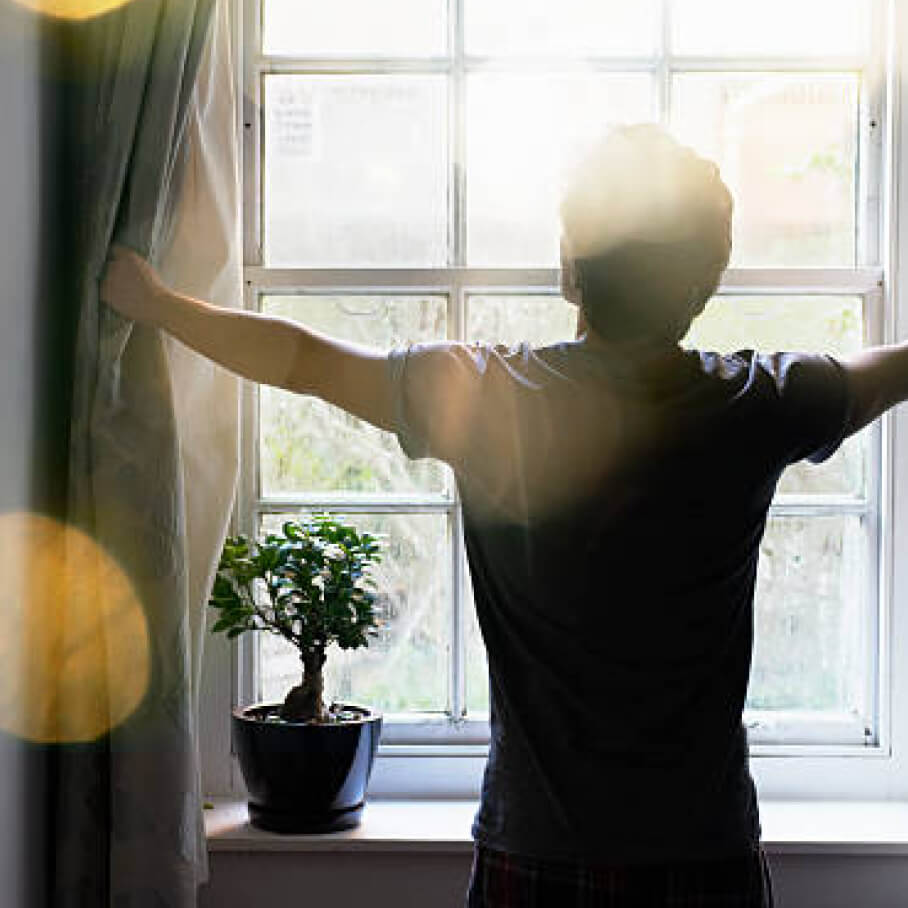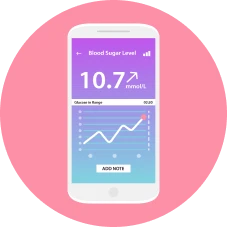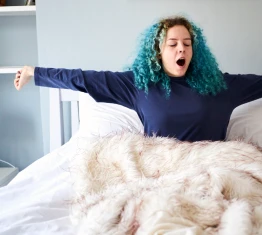The NDSS is administered by Diabetes Australia
- /
- Sleep
Did you know that getting enough sleep can help your manage your diabetes? If you’re struggling to keep your blood glucose levels in your target range, a good night’s sleep might help.
When your sleep well, you can manage your diabetes more easily, since you’ll feel more energised and motivated to stay active. But if you’re not getting enough sleep, it can make it harder to manage your blood glucose levels.
So, let’s talk about how your sleep habits might be affecting your diabetes, and what you can do to get a better night’s sleep.
A good night’s sleep improves your overall health and wellbeing.
A good night’s sleep can make it easier for you to make better food and drink choices.





If you have type 1 diabetes, you might find it hard to get to sleep, or to get enough of it. A bad night’s sleep can be caused by a number of things.
If you don’t sleep well, you might start craving foods that cause your blood glucose levels to rise quickly. These foods usually have a lot of added sugars, and they can make it harder to manage your blood glucose levels.
When you’re tired, it can also affect your mood and motivation, and make you less likely to be physically active. And if you’re not eating well, it can be even harder to manage your blood glucose levels.
So, if you want to keep your blood glucose levels in your target range, it’s important to get enough sleep, eat well and be physically active.
Ask your diabetes health professional for advice if you notice a pattern of high glucose levels early in the morning.
They may suggest:
Children and teenagers might find it difficult to focus, concentrate and solve problems without enough sleep. This can impact their studies.
The recommendations for sleep every night are:


Sleep plays an important role in your emotional and physical health.
If you don’t get enough sleep, it can put you at risk of depression and anxiety. It can also make it challenging to keep up with your study and managing at work. Is worrying about having a hypo overnight keeping you awake? Ask your diabetes health professional if using a continuous glucose monitoring (CGM) or flash glucose monitoring (Flash GM) device that can alert you to low blood glucose levels might help you manage your concerns.
If you’re always worrying about things when you’re trying to get to sleep, try setting aside 30 minutes of “worry time” before going to bed. Write down your worries in a “worry book” or journal.Then close the book, get into bed, and remind yourself that you’ve done your worrying for the day.
Too little
It looks like you’re getting less than 8 hours sleep each night. Have a look at the tips in Tool 2.
Just right: 8-10 hours per night
Well done. How are you feeling? If you still feel tired, it might be worth checking in with your diabetes health professional.
Too much
It looks like you’re getting more than 8 to 10 hours of sleep each night. If you still feel tired, it might be worth checking in with your diabetes health professional.

Helps you wake up. It’s also released in response to stress.
If you’re stressed or don’t have enough sleep over a long period, cortisol can increase your blood glucose level, making it harder to manage your diabetes.

Helps your body know when it’s hungry.
If you don’t get enough sleep, your body can produce more ghrelin. This can make you eat more, making it harder to manage your blood glucose levels and diabetes.

Helps your body to know when you’ve eaten enough.
If you don’t have enough sleep, your body produces less leptin. This means your body doesn’t know when you’ve eaten enough, making it harder to manage your blood glucose levels and diabetes.

Helps your body know when it’s time to go to sleep.
Make sure your bedroom is dark, quiet and at a suitable temperature. This includes turning off all electronic devices such as TVs, mobiles phones and computers at least one hour before bedtime. Avoid large meals, caffeine and alcohol before bed. Try to be consistent with the time you go to bed and wake up.
Get some sunshine
Go outside within 30 to 60 minutes of waking. Walk your dog or go for a walk. Do it again in the late afternoon, prior to sunset.
Regular bed time
Try to go to bed and wake up at the same time every day. Your brain has a master clock that it likes to keep regular.
Temperature
Your brain and body need to drop your temperature by 1-3 degrees for you to fall and stay asleep. Try and keep your bedroom cool at around 18 degrees Celsius.
Darkness
We need darkness to trigger the release of melatonin. Make your room as dark as possible (i.e. digital clocks face away from your view) and go screen-free for at least 30 to 60 minutes before bed.
Use your bedroom for sleep only
It sounds obvious but if you treat your bedroom like a living room where you watch television or chat to friends on the phone, your brain will associate your bedroom with activity. Try doing your homework in another quiet space as well, if you can.
Limit caffeinated drinks
Try not to have caffeine from around noon. That includes some soft drinks, energy drinks, and tea and coffee.



This tip might take you by surprise but if you’ve had a bad night’s sleep, do nothing.
Stick to your usual routine. Try to get up and go to bed at the same time every day.
If you need to nap, aim for a short nap (30-90 minutes)





